Out of the Box Let 3 to Represent Croatia at Eurovision 2023
February 13, 2023 - It finally happened - Croatia has chosen something other than a mellow love song to represent the country at Eurovision. Though there are some exceptionally talented artists in Croatia, and those who represented it so far no doubt fall into this category, let's admit it - it has been formulaic, and that was never enough for the Eurovision contest. Let 3 prove as much with their song Mama ŠČ. For the first time in a long time, they stirred it up and evoked all sorts of reactions, both in Croatia and abroad.
This year's winner certainly brings more than talent. They are a cult Croatian rock band formed in 1987 in Rijeka. Their music and performances have never fallen into any category of normal and ordinary. If you've never seen them, it will be confusion at first sight. They have zero problems with nudity, makeup, or latex. They are no strangers to performance art and love using phallic metaphors. They are not afraid to speak up with social commentary, be it on conservative politics, church, feminism, or the rights of marginalized groups. Whether you love or hate them, one thing is for sure - no one remains indifferent to Let 3. Compared to them, as Večernji points out, even the 2021 Eurovision winner, Maneskin look like made-up theatre puppets.
Who are they?
24Sata summarizes some of Let 3's most brilliant moments. They released their first album 'Two Dogs Fucking' in 1989. From the beginning, Let 3 (Flight 3) were recognizable for their specific humor and bizarre performances.
What was probably their most drastic concept was released in 1997, the album 'Nečuveno' (Unheard of). There was absolutely nothing on the CD, not even recorded silence. Out of 500 copies, 350 were sold. The 'album' contained the band's artist vision - pieces of plastic with serial numbers inserted in a sleeve. The project was accompanied by the video clip 'Neviđeno' (Unseen) - a blank blue screen. It was promoted on the main square in Rijeka.
Their sixth album 'Jedina' (The Only One), was released in 2000, and initially only one copy of the album was made. Let 3 refused to distribute the album, but they did so a few months later.
On February 26, 2001, the band donated the 'Babin kurac' (Grandma's Dick) monument. The monument, four meters high and made of bronze, was revealed in Zagreb, Rijeka, Pula, Split, and Ljubljana. And that wasn't their only sculpture design. In May 2015, they exhibited the sculpture 'Angela Merkel sere' (Angela Merkel Shitting) in Zagreb's Lauba, which they used to criticize the political situation at the time, but also promote the album of the same name.
Members of the band, Mrle and Prlja are also known for their controversial guest appearance with Aleksandar Stanković in HRT's show 'Nedjeljom u 2'. Although they had agreed that there would be no cursing or stripping, they kept 'forgetting.' Finally, ten minutes before the end of the show, Stanković decided to interrupt the broadcast. As they started undressing, the host covered their behinds with a jacket, deciding that the limits were reached when they 'popped' corks out of their buttocks.
What is Mama ŠČ about?
As per the lyrics, mama bought a tractor, and she'd been loving on a moron. There's mention of armageddon, war, and psychopaths. The sound ŠČ confirms it. According to the band, 'ŠČ' is a universal word that can be used in both positive and negative contexts.
"Blessed is our dictionary in which you can say everything with just one word. Until now, we would say jebiga (Croatian for fuck it), and I believe that ŠČ will soon enter the dictionary", said Prlja and added that they are worried about what will happen now, that they have won because undoubtedly their ŠČ products will also become popular in England, and the United Kingdom is no longer in the European Union.
They added that ŠČ is an old Croatian word, sound, and letter. They also emphasized that the theme of their song is the most current topic and that everyone sings it because they want to remain current. They described 'Mama ŠČ' as a socio-political mirror on several levels, writes Večernji. As they said for N1, it is an anti-war song in which they are "sending a message to those who think the planet is their toy and want to control everyone like puppets".
All in all, whether viewed as performance art, social commentary, or just a publicity stunt - it worked. We are endlessly amused by the world discovering Let 3.
For more, make sure to check out our dedicated Lifestyle section.
Croatian Singer Massimo Savic Has Passed Away Aged 60
December 23, 2022 - The famous Croatian singer Massimo Savic has died.
As Jutarnji writes, his daughter and wife reported on their father's and husband's sudden death on Facebook.
"Our dad, husband, pride, and love, Massimo Savic, left us after a short but heroic struggle.
Although he left this world, he will live forever in our souls; smiling, warm, strong, full of love, and woven of art.
We'll be your girls forever.
Eni and Mirna'"
The sad news was also confirmed by the record company Aquarius Records. Massimo died in the Vinogradska hospital, where he was treated for lung cancer.
Massimo Savic was born in Pula on June 6, 1962. He attended and graduated from high school in Zagreb, where his musical career began.
He presented himself to the public for the first time in 1983 as the leader of the synth-pop group Dorian Gray when he released the first album 'Sjaj u tami'. Their second album, "For Your Eyes," was released two years later.
After the group's breakup, Massimo began a successful independent career in the nineties and released four albums in collaboration with Zrinko Tutic.
After a five-year hiatus, he released a new album with the simple title Massimo, followed by the acclaimed albums Vještina and Vještina 2, which returned Massimo to the very top of Croatian mainstream pop-rock music and confirmed that he was one of the best singers in the area.
In the middle of 2011, Massimo released a huge hit, 'Iz jednog pogleda,' whose lyrics and music were written by Predrag Martinjak. This was their first collaboration, which continued until the very end.
In his career, he won nine Porin discography awards and released 17 solo albums.
Massimo tried his hand several times as a jury member in singing shows. The first time was in 2015 when he was a jury member in RTL's X Factor. Two years later, on RTL as well, but this time in Zvijezde. In 2019, Massimo became one of the mentors on the Croatian version of the world-famous project The Voice.
Massimo was also nominated eight times for the Golden Studio media award and won the award twice - for song of the year and best singer.
For more, make sure to check out our dedicated Lifestyle section.
Rising Star: TCN Meets Croatia's Eurovision 2022 Candidate Mia Dimšić
February 28, 2022 - TCN meets Croatia's Eurovision Song Contest candidate Mia Dimšić to gain deeper insight into her experience as a musician and lyricist before she takes the stage in Turin this May.
With Eurovision 2022 fast approaching, there’s a lot to be excited about. After winning the Dora song contest with her new single “Guilty Pleasure”, singer/songwriter Mia Dimšić is gathering attention from fans across Croatia, Europe, and beyond.
The Osijek-born songstress was first discovered in 2014 when tamburitza band Džentlmeni invited her to join them on a tour through Canada and the U.S., singing for the Croatian diaspora across North America. Dimšić subsequently released her first single “Budi mi blizu” in 2015. Since, she has released three Croatian language albums.
When did you begin singing and why did you choose to pursue a career in music?
The beginning of my professional career happened quite by accident. Me touring, meeting my manager. Nearing the end of my college I just knew I didn’t want to do that for the rest of my life because I was into music. So, I would say the beginning of my professional career was in 2015 when I released my first single. But also, of course, my whole life revolved around singing and music. I don’t really think music is limited to professional musicians. There are a lot of people who just live music 24/7 but they don’t earn their income from it.
Do you come from an artistic family?
Well, my dad also studied guitar in musical school. So, he has a basic musical education, I would say. He also had a band before I was born but he never played professionally. It was more like just a side job along with his day job. I was actually the first in my big circle of family and friends to really decide to be a professional singer/songwriter. So, I never had people around me who were songwriters. I met my manager who also writes songs in 2014; someone just next to me who I can really ask what makes a good song. When I write something down I ask is it good or not? How can I tell if it's good or not? I didn’t grow up around it, but I maybe prefer it that way because I developed my own theories about it and the principles and then I kind of got into that world later.
What kind of singer would you classify yourself as?
I think I’m a singer-songwriter first and foremost because I’m pretty sure I would never have been a success if I didn’t write my own songs. Because I think, for me the most important moment was this storyteller moment. I am a huge fan of Taylor Swift and the way she just tells stories through lyrics is something that never fails to amaze me. So, whether it be the happy romance story or just some sentence I heard along the way or something my friends told me about when I feel strongly about something the most therapeutic way to deal with it is just to sit down and write a song. That’s what I want to do. I want to tell stories through music.
Your song “Guilty Pleasure” won the Dora singing competition, congratulations! What skills did you learn from the competition that you think will help you during Eurovision as well as in your future career?
Well, there were so many interesting lessons. First of all, just standing on a stage like that is not an everyday opportunity in such a small market as the Croatian market. So, for all of us young singers there, it was such a fantastic experience in terms of audio production, visual production and just getting used to the big stage. I think that that will be very useful in touring. Also, I bonded with a lot of new people. That was the most amazing part, and I can’t wait to do the same when touring and meeting some international stars I’ve been watching throughout the years.
Also, one of the big life lessons Dora brought was just to enjoy the moment. Because all of us contestants just wanted to win. It can get pretty competitive, and it can get pretty stressful you’re under a lot of media attention. So, I said to myself, just being there among the 14 contestants is already me winning, just winning life because I’m learning something new. I’m gaining some new experiences. And if I manage to get that mindset in Turin, I know that everything is going to be fine because I think problems arise when people are very stiff and are obsessing about something. Music really should be about living in the present moment. So, I think if I come there and manage to just enjoy every day, every rehearsal, every encounter, then the results are going to be good as well.
What was your inspiration behind “Guilty Pleasure”? Do you have a personal story underlying the lyrics?
Yes, absolutely. It is just the most fun and the best experience ever when you write something specific about your experience and then it goes out into the world and people somehow connect to it. In this case, I had a dream five nights in a row, as the first lines say. It was very literal. I dreamt about someone I felt I wasn’t supposed to be dreaming about. And since I was a teenager since I started falling in love and stuff like that, I’ve always been obsessed with the idea of ‘how do you really decide on just one person?’ You know you get married to that person and that’s it. How do you know if they are right for you? How did women know in the 19th century? When practically their whole life depended on them marrying the right person or it could be a disaster if they married the wrong person?
I am just so fascinated by that question. Is monogamy really the path humanity should be choosing or are we just raised that way? We’re not looking for any other way. ‘Guilty Pleasure’ was actually a song about that. The ending of the song and also the visual choreography that we put with a song where I have a male dancer who represents that fantasy of mine. I want to run away with him, but also I’m not sure because I have a safe harbor. I have someone else in my life. What if it’s just an illusion? What if I am romanticizing it? And then in the end there’s an instance where we almost kiss, but the viewer is not sure if we do, or we don’t. So, actually, I’m not sure either. The ending of the song is my question. Should I run away with you, or should I just let it be? It’s a very light catchy pop song. But what inspired me to write it are very tricky questions that are really messy.
Describe your creative process. Where does your inspiration come from when you write your songs?
For me, it always goes music first and then lyrics. I am very obsessed with lyrics having to rhyme and every verse has to be symmetrical. I am very much a lover of symmetrical lines, and I am trying to use pretty words that sound nice when you sing them. I am careful and pay a lot of attention to that.
What musicians do you admire most and why?
I discovered Taylor Swift when I was 16 years old. Back then she just released her first international album “Fearless”. And I heard Love Story and I was in the exact same situation. I wanted to meet with a boy and my parents wouldn’t let me. He lived on the other side of Croatia. So, for me just listening to that song felt like OMG Taylor Swift read through my diary. That’s the only possible explanation for her incredible insight into our souls, in our lives. Throughout the years whenever I had a certain situation, I just connected to her songs. Literally today, I’m 29 years old and if you tell me any of her songs from any of her albums, I will tell you what was happening to me when I first heard it. I guess it’s like what you said, we humans only exist to share the same kind of emotions through different stories with each other. And I think the most amazing part of her as a songwriter is that she can take something very complex into two lines of a song. And you’ll just hear it and maybe it’s something completely different from what you’ve ever experienced but you will feel like you’ve been there. That for me is art. Putting something we all know so well but don’t how to verbalize, for me, that’s a true artist.
Throughout Eurovision history, singers choose the language of a song for different reasons. Most of your music up to this point has been in Croatian. Why did you choose to write an English song this time?
That’s a really good question. I actually spent the entirety of 2021 writing songs in English only because I entered a phase of wanting to start the English chapter of my journey. I’ve always wanted that since my first Croatian song. I thought, ok maybe I should first work in the domestic field and with time and with the experience I can start writing songs in English too. Actually, my first motive for Dora, in the first place if I applied because I wanted to, if I hypothetically got the chance to go to Eurovision, I want to present my music to as many non-Croatian speaking people as I can. I think Eurovision is a great opportunity for that. It’s definitely an incredible festival. But, for me, it should not just be the end. It should be the first stage where I get such an incredible experience and audience. But I want to keep on releasing English music and going in that direction.
How does it feel to be representing Croatia on such an international stage?
It’s incredible. I am very proud of my team. We’ve worked so hard for this. I am very excited. I can’t wait to go to Turin. Of course, there is always some kind of pressure because everyone feels very intensely about Eurovision and everyone has their own opinion. Whoever wins in Croatia will always face a lot of backlashes as well. Almost every year there are stories about who won. But I think this part as well will also make me a stronger person and stronger artist. I just think it is a huge honor and a huge privilege.
What are your aspirations going into the European Song Contest? Obviously, not all countries have submitted their entries, but do you see any clear front runners who will make for a tough competition?
I think Italy will do really well this year. Everyone is loving the song and I love the song as well. I think Eurovision trends change so rapidly every year that it’s so hard to say what will catch peoples’ attention this year. I think it is going to be a wonderful Eurovision this year. There are so many interesting songs and there is a huge variety of different genres of music.
Going forward, what are your plans beyond Eurovision? What are your goals for your career?
My goals for my career are currently just doing everything I can to present ‘Guilty Pleasure’ to as many people not just around Europe but around the world. Next week, I am also finally filming a music video which will be filmed in the region where I am from. So, it’ll showcase all its beauty. I am hoping to also have a couple of other English songs ready the moment I reach Turin. I can just find people who like it and connect with the producers. I think networking is the most valuable thing we can get from Eurovision. After Eurovision, I don’t want to just come home and forget it happened and continue releasing the normal songs that I’ve got planned out. I also want it to be a starting point for new collaborations. I hope this plan will work. I really really want it to work. I’ll do my best. I just hope when people remember me, they’re going to remember the song or they are going to remember that I was there that year. That’s all I’m hoping for right now.
For more, check out our lifestyle section.
Miroslav Krleža Institute of Lexicography Publishes Book On All things Turopolje
May 7, 2021 - Last month, The Miroslav Krleža Institute of Lexicography had a presentation in Velika Gorica regarding the newly published book on all things Turopolje.
The ever-fascinating region of Turopolje, not so far from Zagreb, as the largest city of the region is Velika Gorica (connected by Zagreb with a regular public service bus) earlier this month good a book that gives an overview of every knowledge collected about Turopolje. Or in a noun: a lexicon.
As The Miroslav Krleža Institute of Lexicography informs on its website, the end of April saw the presentation of the latest work in the edition of the Institute in Velika Gorica.
In respect to the epidemiological measures, the presentation was held among a limited number of journalists and attendees. Nina Obuljen Koržinek, the minister of culture was present along with the mayor of Velika Gorica Krešimir Ačkar, and the head if Miroslav Krleža Insitute, Bruno Kragić. The county ruler of the noble county of Turopolje Mladen Klemenčić was present too and talked about the book. Katja Matković Mikulčić, the headmistress of Velika Gorica City Library and a co-editor of the lexicon, had an opening speech.
The accompanying culture program saw an actor and singer Adam Končić recite poems by Krleža (a famous Croatian writer, poet, publicist, and encyclopedist the Institute was named after) and pupils from Franje Lučić Art School that sing with the back-up of Krešimir Starčević that followed the notes of a famous conductor from Turopolje Franjo Lučić (the inspiration for the name of the art school).
As usual, the Institute was determined to gather as a wider circle of associates as possible, especially the authors. Some of the authors are individuals from heritage, educational, and cultural institutions, but researchers from specific scientific areas and noted publicists contributed to the book as well.
„The project started with the overwhelming support of the City of Velika Gorica, the central administration unit of Turopolje, and the cooperation contract was signed in 2018. With its concept and graphics, this lexicon continues the previous editions of the Lexicography Institute, which focuses on individual Croatian regions (Istria, Croatian Zagorje) or towns (Zagreb)“, the Institute's website quotes the foreword of the book.
When it comes to history, science, and art, museums are great institutions to learn more. You can learn more about museums in Croatia on our TC page.
For more about science in Croatia, follow TCN's dedicated page.
VIDEO: 200 Croatian Musicians Perform Unifying Favourite at Bundek
February 23, 2021 – In uplifting scenes filmed on Lake Bundek, Zagreb, 200 Croatian musicians gathered to record a unifying rendition of beloved Croatian hit 'Za ljubav, Treba imat dušu' (For Love, You Need To Have a Soul) by Atomsko Sklonište
It's been 12 months to try and forget. Within a world locked inside by a global pandemic, some in Croatia also became locked out when a series of earthquakes damaged or brought down their family houses. Passing from a state of isolation into one of dreadful uncertainty, it's understandable that some could have been left feeling helpless and alone.
Never ones to be defeated by any crisis, Croatians are well known to pull together when their backs are against the walls. The volunteering effort following Croatia's 2020 earthquakes has offered heartwarming insight into who Croatians are today. In the latest response, 200 Croatian musicians have come together to perform a unifying favourite hit from yesteryear. In the video, the 200 Croatian musicians can be seen playing 'Za ljubav, Treba imat dušu' (For Love, You Need To Have a Soul) by Atomsko Sklonište.
The song chosen for the uplifting effort, '(Za ljubav) Treba imat dušu' was first released in 1982 by Atomsko Sklonište (Atomic Shelter) on their album 'Mentalna Higijena'. Formed in Pula in 1977, the band were popular all over the former Yugoslav federation and became known for performing songs with an anti-war message.
Though the band have undergone a series of lineup changes since the late 1970s, they still perform concerts to this day. Indeed, among the 200 Croatian musicians filmed in the video, we can see Atomsko Sklonište's Bruno Langer playing bass guitar. He has been the bass player of Atomsko Sklonište since they first formed and he leads the band today. Bruno Langer is the writer of '(Za ljubav) Treba imat dušu' which the 200 Croatian musicians play.
The 200 Croatian musicians were comprised of 50 drummers, 50 guitarists, 50 bassists and 50 vocalists. Many are professional musicians who contribute to the contemporary rock and pop scene in Croatia, as well as some well-established performers such as members of Prljavo Kazalište. The 200 Croatian musicians came from across Croatia to volunteer their time for the project, including from Dubrovnik, Pula, Split, Osijek, Rijeka, Požega, Županja, Karlovac, Zagreb and Bjelovar.
For the latest travel info, bookmark our main travel info article, which is updated daily.
Read the Croatian Travel Update in your language - now available in 24 languages.
Richness of Traditional Croatian Christmas Songs In One Spotify Playlist
December 21, 2020 – Among many other things, Croatia can also be proud of its Christmas music tradition. For the perfect Christmas atmosphere, Croatian musician and guitarist Mihael Majetić singled out 54 of the best traditional Croatian Christmas songs in one Spotify playlist.
Traditional Croatian Christmas songs are considered the most numerous in the world, but it isn't easy to count them because they are mostly preserved by word of mouth. They are a precious and favorite part of the rich Croatian Christmas tradition, but also the Croatian cultural identity, and they belong to the most diverse and beautiful in the world.
Due to the coronavirus pandemic, many musical events had to be postponed this year, including many Christmas concerts showing their splendor every year. Choral church singing is also limited. However, despite the many negativities that 2020 brought to the Croatian and world music scene, some positive changes have taken place.
One of them is, of course, the arrival of the streaming service Spotify on the Croatian market, which allows Croatians to stream music without interruption, while Croatian musicians have another platform on which their music can be available. Therefore, this year, instead of experiencing live concerts, Croatians can stream music via Spotify. Due to this year's overall situation, traditional Croatian Christmas songs can be listened to exclusively in the pleasant home environment, but this in no way diminishes their beauty.
The incredible repertoire of traditional (but also popular) Croatian Christmas songs is now even more accessible. And to separate them all from the sea of different Christmas songs and gather them in one place, Croatian musician and guitarist with a London address, Mihael Majetić, compiled a playlist of 54 creative and original arrangements of traditional Croatian Christmas songs on Spotify.
A native of the Slavonian city of Valpovo, Mihael attended the Elly Bašić High School of Music in Zagreb and then continued his education at the prestigious Royal Academy of Music in London. He graduated last year and currently lives in London.
"The main guiding thought when choosing the songs was the quality of the arrangement and performance. The playlist includes exclusively Croatian traditional songs, but performed in different styles. So, in addition to the classics, you can also hear jazz, salsa, R'n'B, klapa, and tamburitza players. I do not claim that the list is final. I may even adjust it. And I will certainly be grateful if someone contacts me with suggestions that I may have missed," says Mihael, whose interest in the work of other musicians led him to listen to Croatian Christmas albums and thus making this playlist. In addition to performing and teaching guitar, he is also involved in arranging music.
The rich playlist includes some of the most famous names from the Croatian music scene, such as the recently deceased Krunoslav Kićo Slabinac, also one of the first Croatian musicians to record a Christmas album back in 1982. Although he was celebrated for his "bećarac "and rock songs, his album "Christmas with Kićo" became the best-selling Christmas album in the region of all time, with more than half a million copies sold. Out of the 11 Christmas songs from the album, two found their place on this playlist – "U to vrijeme godišta" ("At that time of year") and "Narodi nam se (kralj nebeski)" ("The king of heaven was born"). By the way, these are two very old archaic Croatian songs, and Kićo's versions are adorned with the inevitable overtones of tamburitza in the background.
The song "U to vrijeme godišta", or the old Chakavian form "U se vrime godišča" has its origin in the Latin tune "In hoc ani circulo" from the repertoire of St. Martial in the 11th century in the French city of Limoges. This tune spread from Italy to the Croatian south and from the Czech Republic to the Croatian north. Due to its popularity, it was given an honorary performance before the Christmas Gospel during Holy Mass.
"U to vrijeme godišta", otherwise the most widespread song in all three Croatian dialects (Chakavian, Kajkavian, and Shtokavian), according to musicologist Miha Demović, has a Glagolitic inscription, and the oldest dates from the 14th century. Apart from Kićo's songs, this playlist includes performances by the group Cubismo and composer Igor Kuljerić, conductor Tonči Bilić, and the Croatian Radio and Television Choir. Both versions of the song, Shtokavian and Chakavian, can be found on the playlist performed by the Mostar Cathedral Choir together with the Mostar Symphony Orchestra and composer Nikica Kalogjer, and singer Josipa Lisac and the Ivan Goran Kovačić Choir.
Apart from "U to vrijeme godišta," the song "Narodi nam se" is one of the oldest traditional Croatian Christmas songs. As reported by the Hrvatska katolička mreža (Croatian Catholic Network), and explained by Tihomir Prša, professor of church music at the Faculty of Teacher Education, University of Zagreb, this song dates back to the 13th century. Namely, Christ's name "young king" from the song reminds of the time of Arpadović in Croatia when the Hungarian kings wanted to crown their firstborn king as soon as possible. The expression "young year" reminds of the time when the new year began in Croatia on Christmas, and it was not after the 13th century. All worship services and all Croatian Christmas albums conclude with it.
The already mentioned performers also found a place on this playlist with the performances of the song "Narodi nam se se", and the performance of the Croatian singer Marija Husar from her album "Plesni Božić "("Dance Christmas") from 2009 is lovely.
The song "Kyrie eleison" which translated from Greek means "Lord, have mercy", is also one of the most famous Croatian Christmas songs, despite the Greek title and parts of the song in Greek. According to the first manuscript, it originates from the 19th century in Međimurje, and professor Prša reveals that the song was written by the Kolaj family. The author of the word was organist Janko Kolaj from Kotoriba. His son Ambrozius wrote down the words of a song from 1835.
Of the other traditional Croatian Christmas songs, the most famous are "Radujte se narodi" (Rejoice, people), "Veselje ti navješćujem" (I announce joy to you), "Svim na Zemlji" (To all on Earth), "Djetešce nam se rodilo" (A child was born), "Oj pastiri, čudo novo" (Oh shepherd, a new miracle). The only foreign song that is sung during the Christmas Mass in Croatia is "Silent Night". Christmas songs have a special meaning for Croats because they express their faith and find haven in them.
In addition to the already mentioned performers, the playlist includes performances by singer Marko Tolja, singer Mia Dimšić, composer Igor Geržina, pianist Matija Dedić, Jazz Orchestra of the Croatian Radio and Television (Big Band), music duo Marko & Laci featuring Zita and Ivana, composer Anđelko Igrec, the only organ duo in Croatia – Quattro Obbligato, and Klapa Luka Ploče.
To follow Mihael Majetić, visit his profiles on Spotify, Facebook, and Instagram, as well as his website.
To read more news about Croatia, follow TCN's dedicated page.
Croatian Musician Thana Alexa Pavelic Nominated for Grammy
November 28, 2020 – With her second solo album, ONA, Croatian American musician Thana Alexa Pavelic explores her Croatian heritage. It's just been nominated for a Grammy! Here's an introduction to a singular talent and the sound of her Croatian roots
The songs of Croatian American jazz musician and singer Thana Alexa Pavelic have never sounded more like her life experience. On her second album, 'ONA', we finally hear her Croatian roots colliding with the cool, considered and contemporary world of the New York jazz scene. Legendary for its jazz for over 70 years, the city of New York is full of ambitious musicians chasing the vibe and reputation of its heritage. It can be tough to stand out, to sound original. With 'ONA', Thana Alexa Pavelic has done just that, and earned a Grammy nomination for her efforts.
Published in 2015, Thana Alexa Pavelic's debut album 'Ode To Heroes' was similarly well accomplished. But, it seemed to more reflect her American experience rather than embracing the whole. Born in New York to a father from Zagreb and a mother of Dubrovnik heritage, Thana Alexa Pavelic spent every summer in Croatia and so was hardly uprooted when the family moved back to Croatia when Thana was 13. She returned to America to complete her university studies – music and psychology.
In comparison to 'Ode To Heroes', new album 'ONA' sees Thana Alexa Pavelic replacing her femininity with feminism – the album is inspired by the experiences of Croatian women, most of all her mother and her grandmother. Not just evident in the language of the album title, for the first time in her solo output, on 'ONA' you can hear Croatian language, traditional Croatian music and the Croatian female experience in the songs of Thana Alexa Pavelic.
It is doubtless these Croatian influences that separate Thana Alexa Pavelic from the rest of 2020's jazz hopefuls. They are partially responsible - alongside the superb execution and production of the songs - for the Grammy nomination. It is the first-ever Grammy nomination received by a Croatian musician.
And, rather than simply take from the Croatian experience, 'ONA' also gives back. Thana Alexa Pavelic has dedicated a donation from each sale of the album to Zagreb-based human rights organisation Solidarna and their #spasime campaign (which supports victims of violence). Whether Thana Alexa Pavelic wins the Grammy for Best Vocal Jazz album or not, with 'ONA', she has placed a Croatian voice on the world's music stage in more ways than one. If she is successful, then the award will surely make its way to Croatia at some point, held in the hands of a Transatlantic artist now exploring in music her Croatian heritage. Good luck at the Grammys Thana Alexa!
Croatia Records Jugoton Funk Reveals Hrvatska's Heaviest Grooves
ZAGREB October 23, 2020 - Preserved by Zagreb's Croatia Records, the vast archive of giant Yugoslavian music label Jugoton throws up some incredible surprises on the newly released Croatia Records Jugoton Funk Vol. 1
James Brown, Funkadelic, Sly & The Family Stone, Fela Kuti - when you think of funk music, it's black artists that usually come to mind. Although, not if you're Croatian. One of the country's best-loved (and most missed) musicians, Dino Dvornik, was often referred to as the King Of Croatian Funk - his electro explorations in the genre during the early 90s were so innovative they don't sound out of place on dancefloors today. But, though he here might be known as the king of this style, Dino Dvornik was far from the first to record funk music in Croatia.
Marijan Kašaj - Ideja
One of the highlights of Croatia Records Jugoton Funk Vol. 1. Although a classically trained opera singer, Zagreb's Marijan Kašaj expressed a much more rough vocal style when singing rock music, notably as the frontman of the band Grešnici (The Sinners). This song comes only from a rare 45 single and was composed and arranged by Vladimir Delač
The recently released Croatia Records Jugoton Funk Vol. 1 compilation finally lifts the lid on the largely untold history of homegrown Croatian funk music. Culled from the darkest depths of the gargantuan Croatia Records Jugoton archive in Dubrava, this collection tells a story of ambitious musicians joyfully creating some of the wildest sounds to have ever come from these lands. Effortlessly cool and in many cases very surprising, it is a soundtrack that is perhaps even more relevant on today's world stage than when it was made.
Dalibor Brun - Davni život
Rijeka musician Dalibor Brun explored soul and funk music across three solo albums. This track, from his third, features a wild Hammond solo performed by extremely famous Croatian singer and songwriter Oliver Dragojević. “You can hear some funky tracks in Oliver's own back catalogue, but to find him playing such a wild style as a session musician on Dalibor Brun's track is a very unexpected,” says Dr. Smeđi Šećer. “At the time of these recordings, some of these artists were already well established, so they could afford to collaborate and experiment as they wished.”
“Most of Jugoton's output was pop and folk music,” Croatia Records Jugoton Funk Vol. 1's Dr. Smeđi Šećer tells TCN. Alongside co-compiler, Zagreb's Višeslav Laboš, this Rijeka DJ is part of a small scene of enthusiasts who have been reviving the ex-Yu funk sound over recent years - online, on mixtapes and at niche club nights. “These are mostly very obscure releases. You would have to go looking around secondhand record shops for maybe 10 years to find all of these.”
Igor Savin - Alfa
Son of prominent Croatian conductor, composer and opera director Dragutin Savin (longtime director of the Osijek Opera), Igor Savin is a pianist, vibraphonist, composer, arranger and producer who studied at the Theoretical Department of the Academy of Music in Zagreb. He continued his studies by one of the first Croatian students at the prestigious American College of Contemporary Music Industry Berklee College of Music in Boston where he studied harmony, improvisation and composition. As an eighteen-year-old, he founded his first jazz band. He played piano and vibraphone in symphony, studio and festival orchestras, and in the Big Band of HRT. He is the author of music for numerous films, cartoons, television shows, theatre plays and often used melodies from Balkan folk music to inspire his jazz and contemporary classical pieces. In 1984, he founded the electronic studio of the Vatroslav Lisinski Concert Hall.
Time spent rifling through secondhand shops for old, forgotten and obscure music is a pastime known as digging. A phenomenon popularised since the birth of American hip hop in the 1980s, it has been responsible for turning the music of the past into some of the most-contemporary sounds we hear on today's radio or dancefloors. Over the last four decades, countless soul, R&B and hip hop stars have sampled older music to create chart-topping hits. Digging for vintage sounds has subsequently become a global trade. Obsessives Dr. Smeđi Šećer and Višeslav Laboš are two of the best-informed that search for contemporary-relevant sounds in the back catalogues of Balkan music.
Josipa Lisac - Ležaj od suza
'Ležaj od suza' (A bed of tears) is taken from Croatian megastar Josipa Lisac's classic debut LP 'Dnevnik jedne ljubavi'. It is not the only track on the album which you can hear international funk DJs play in some of the coolest clubs in London, Berlin, Manchester and New York. She is backed here by Jugoton's first prog-rock band, Time, plus the strings and horns section of the HRT Orchestra. The iconic cover art of Lisac's debut album was a photograph taken by Croatian photographer Jozo Ćetković, who also took the photograph of Croatian model Branka Habek which is used to form the cover art of Croatia Records Jugoton Funk Vol. 1
For Croatia Records Jugoton Funk Vol. 1, they've been greatly assisted in their endeavors by Zagreb's Croatia Records. Not always regarded as the hippest supplier of niche sounds like forgotten funk, Croatia Records's careful preservation of the Jugoton back catalogue (which they inherited after the break-up of Yugoslavia), has meant that the entire recorded history of the giant Yugoslav label has been made available not only to album compilers like Smeđi Šećer and Višeslav Laboš, but to all. Over recent years, Croatia Records has embarked on an ambitious project to digitalise the entire Jugoton archive. Containing some 70, 000 music recordings and 14, 000 artifacts, this is no small undertaking.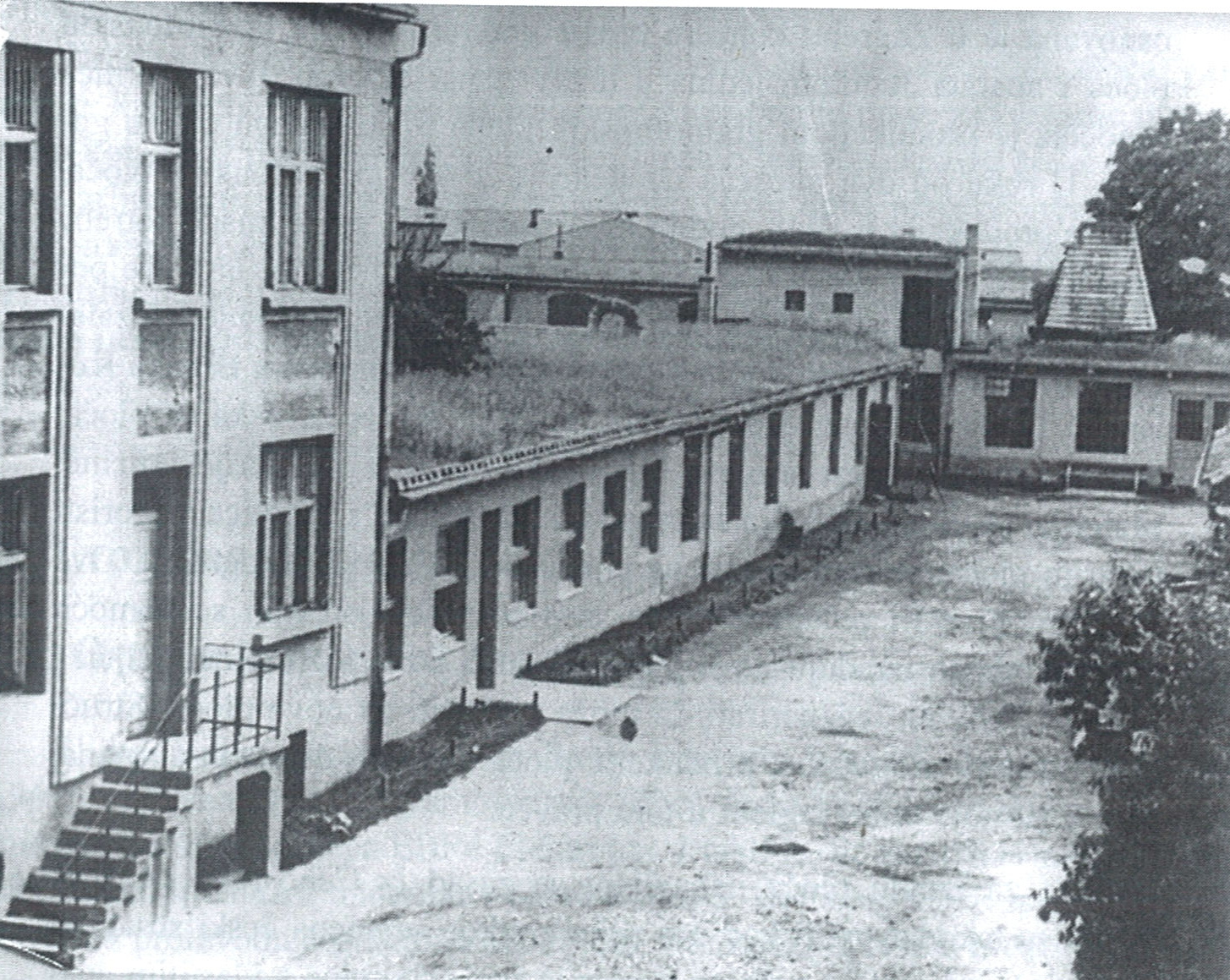 The first Jugoton Records HQ, located at Ilica 213, Zagreb. It subsequently moved to Dubrava, on the site where Croatia Records remains today © Photos from the book History of Vinyl Production in Croatia by Veljko Lipovšćak - provided by Croatia Records
The first Jugoton Records HQ, located at Ilica 213, Zagreb. It subsequently moved to Dubrava, on the site where Croatia Records remains today © Photos from the book History of Vinyl Production in Croatia by Veljko Lipovšćak - provided by Croatia Records
Of all the companies that issued music in the former Yugoslavia, Jugoton was the largest. Based in Dubrava, Zagreb, Jugoton was much more than the type of record label we know today - theirs was an entire industry of culture. Jugoton traces its roots all the way back to the 1930s when it began life as the Elektroton label. After the Second World War, the label was nationalized and renamed Jugoton.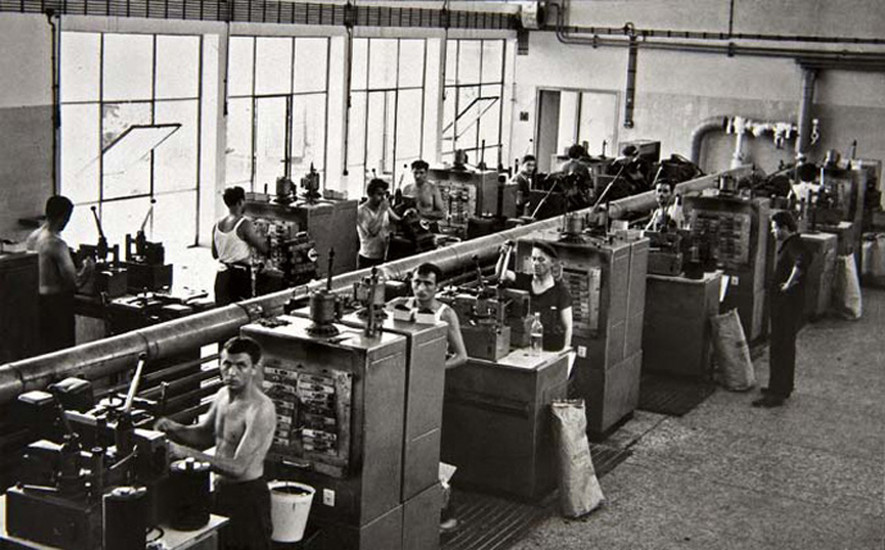
 In the two photos above, we can see the Jugoton vinyl pressing factory at two different stages of its evolution © Photos from the book History of Vinyl Production in Croatia by Veljko Lipovšćak - provided by Croatia Records
In the two photos above, we can see the Jugoton vinyl pressing factory at two different stages of its evolution © Photos from the book History of Vinyl Production in Croatia by Veljko Lipovšćak - provided by Croatia Records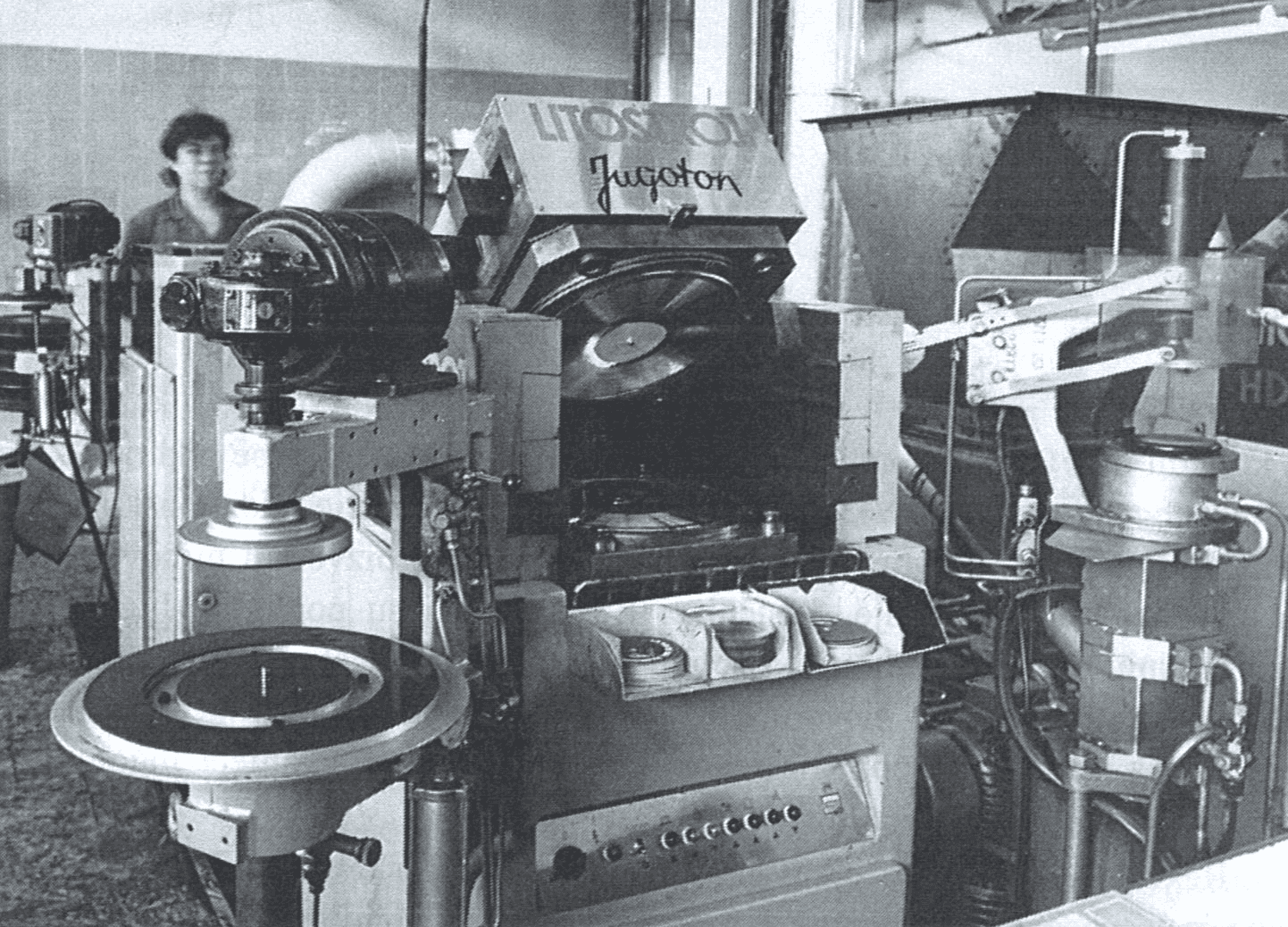 The hydraulic semi-automatic vinyl pressing machine 'Litostroj' at the Jugoton pressing plant 1967 - 1979 © From the book History of Vinyl Production in Croatia by Veljko Lipovšćak - provided by Croatia Records
The hydraulic semi-automatic vinyl pressing machine 'Litostroj' at the Jugoton pressing plant 1967 - 1979 © From the book History of Vinyl Production in Croatia by Veljko Lipovšćak - provided by Croatia Records
At the peak of its influence, Zagreb's Jugoton did more than just sign artists and release music. On the Dubrava site where Croatia Records now stands was a then ultra-modern production studio where famous artists from all over Yugoslavia would come and record. Jugoton made its own discs – at its peak, Jugoton's pressing plant churned out 30, 000 vinyl records every day. By 1982, its decade-old cassette production line made 20,000 units per day. They also owned the largest chain of music stores within the country. As well as the domestic artists signed to Jugoton, the label licensed and released music by some of the biggest artists of the day, including Elvis Presley, The Beatles, The Rolling Stones, Deep Purple and Pink Floyd. Its audience was the 20 million+ inhabitants of Yugoslavia.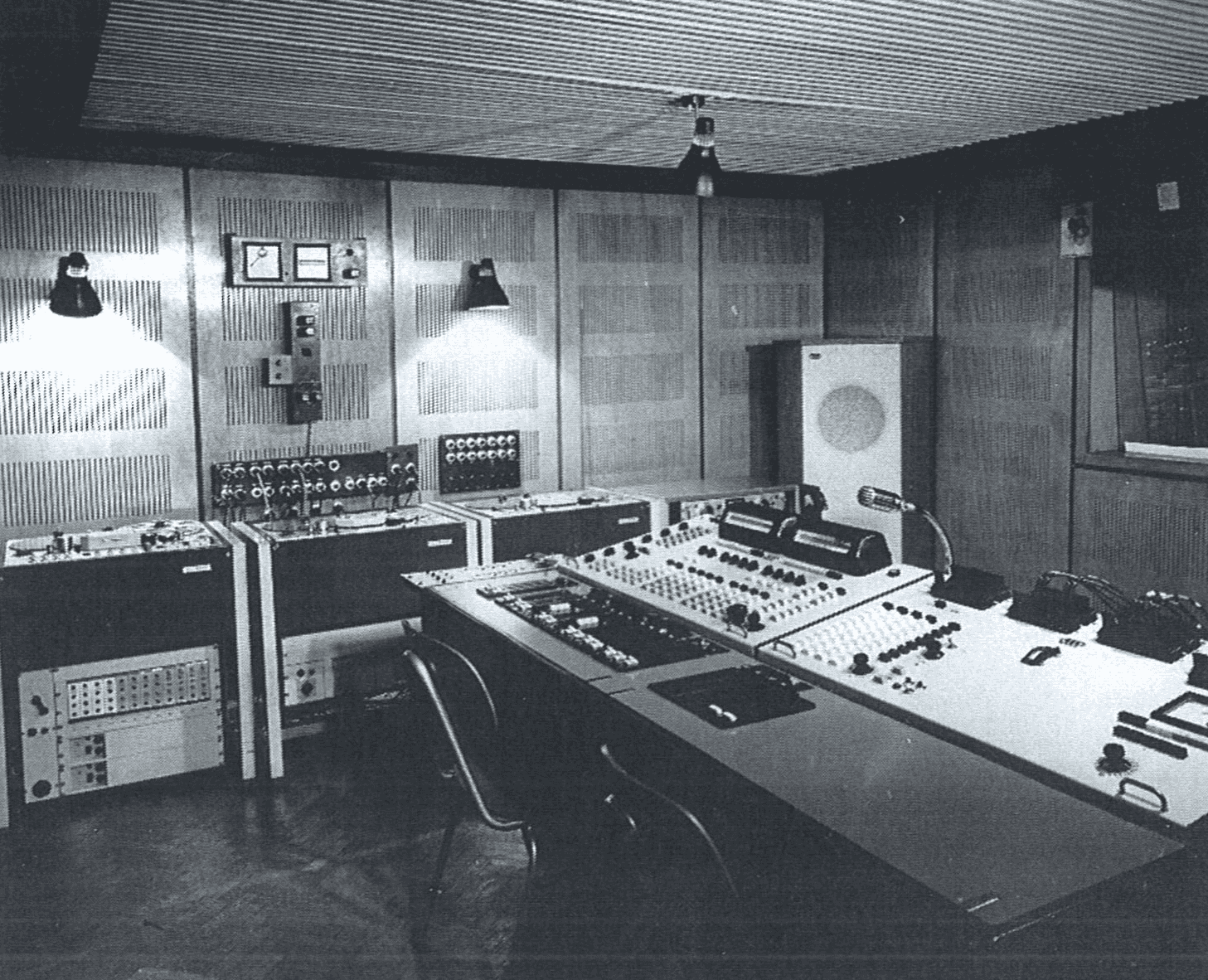 Part of the Jugoton studio set up on the Dubrava site. This specific equipment was in use between 1964 and 1975 © From the book History of Vinyl Production in Croatia by Veljko Lipovšćak - provided by Croatia Records
Part of the Jugoton studio set up on the Dubrava site. This specific equipment was in use between 1964 and 1975 © From the book History of Vinyl Production in Croatia by Veljko Lipovšćak - provided by Croatia Records
Though the music contained in Croatia Records Jugoton Funk Vol. 1 does not sound immediately like the folk and pop music we associate with the label, considering the size of the Croatia Records Jugoton archive it is perhaps less surprising that such anomalies can be found.
“Western music always had a strong appeal in Yugoslavia,” says Dr. Smeđi Šećer. “At the beginning of the communist regime, there was a strong implementation of censorship. But, in the 1960s the (communist) party seemed to relax and allow some western influences through. From this decade, a lot of cover versions of western artists started to be recorded by Yugoslavian singers. Yugoslavian labels would officially license western music and release it here. For instance, you can find releases by Ray Charles on the PGP-RTB label out of Belgrade from the early 1960s. All of this started to influence the music made here. Arsen Dedić, for example, recorded the first Yugoslavian bossa nova record in 1963.”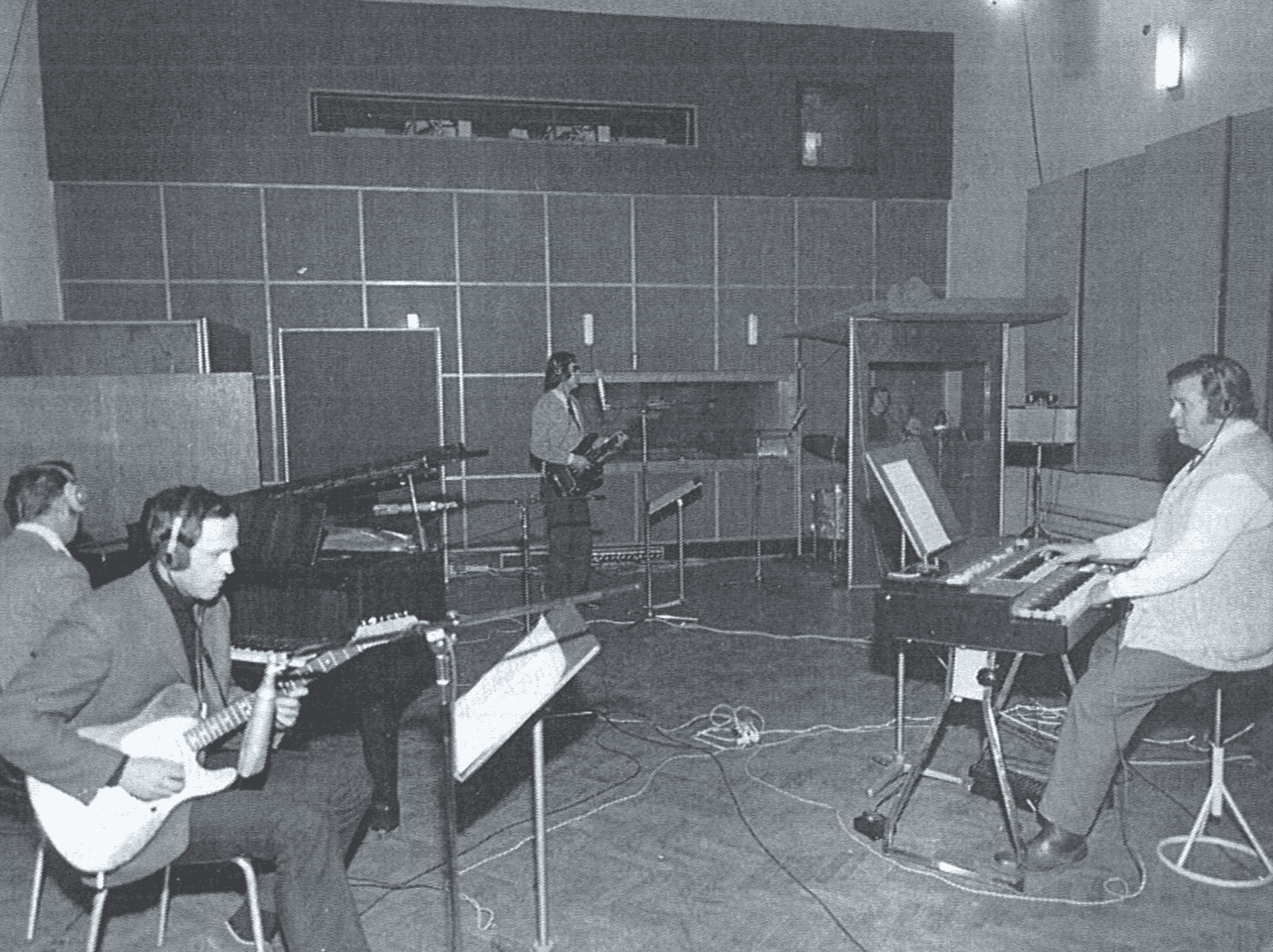 Zagreb musicians pictured at the small sound hall at Jadran film © From the book History of Vinyl Production in Croatia by Veljko Lipovšćak - provided by Croatia Records
Zagreb musicians pictured at the small sound hall at Jadran film © From the book History of Vinyl Production in Croatia by Veljko Lipovšćak - provided by Croatia Records
“The funk sound from here can be really interesting - quite unique. While some bands did try to record this black American music in exactly the style as the Americans did it, many artists from here enjoyed experimenting with the style - in particular some pop artists and progressive rock bands. They took the rhythm and the funk from the American music, but added their own styles – sometimes distinctly Balkan styles – over the top. Boki Milošević and the Belgrade Jazz Orchestra spring to mind immediately.”
Zdravko Čolić - Mujo kuje konja po mjesecu
A giant of Yugoslavian music, Zdravko Čolić's inclusion on Croatia Records Jugoton Funk Vol. 1 is one of the most unusual (and rarest) pieces of music in his back catalogue. It is a funk version of the Bosnian sevdah classic 'Mujo kuje konja po mjesecu (Mujo changes the horseshoe by the moonlight)'. “This is from an extremely rare compilation of pop festival music,” says Dr. Smeđi Šećer. “It's not something you'd come across every day. It was shown to me by a Slovenian DJ colleague. I only ever saw a physical copy of this release maybe two or three times in all my years spent digging.”
The world's largest exporter of music is the United States. The second-largest is the United Kingdom. That these two largest exporters share a common language – and it being one of the world's most widely spoken – is no coincidence. It can be difficult to export music from Croatia and other Balkan nations purely because of the language barrier. People like to understand the text of what they are listening to. Such barriers can be overcome with overtly emotional delivery, such as in the case of folk music like sevdah, but also when the musical style is something relevant to the dancefloor. Especially within a niche international scene like rare funk.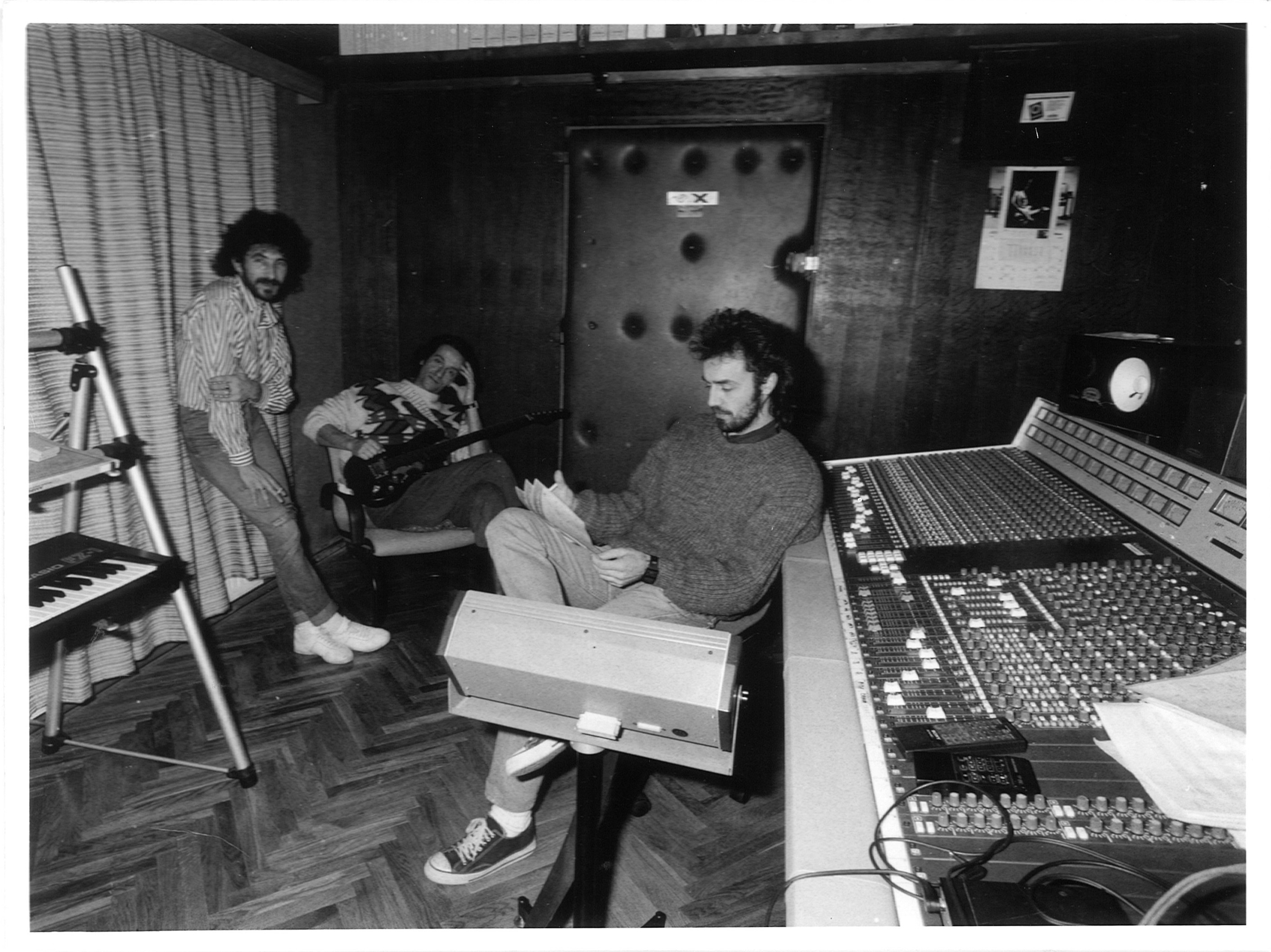 Even after the label stopped being Jugoton and became Croatia Records, famous artists from all the former countries of Yugoslavia would still come to work at the recording studios in Dubrava. In this photo from the early 1990s we see (left to right) Croatian singer Željko Bebek from the Sarajevo-formed Yugoslavian rock giants Bijelo Dugme, Macedonian guitar virtuoso Vlatko Stefanovski from the band Leb i sol and Bosnian singer, guitarist, arranger and producer Nikša Bratoš from the band Crvena Jabuka. Bijelo Dugme was the most popular and best-selling rock band from Yugoslavia. Their first recordings were offered to record label Diskoton in their native Sarajevo. They were turned down, allegedly as the label's release schedule was already full for the following six months. This is widely considered the greatest business mistake in the history of Yugoslav record publishing. On the same day as this refusal, Zagreb's Jugoton snapped the band up for an initial five-year contract © Photo from the Croatia Records archive and licensed for exclusive use within this article by Croatia Records
Even after the label stopped being Jugoton and became Croatia Records, famous artists from all the former countries of Yugoslavia would still come to work at the recording studios in Dubrava. In this photo from the early 1990s we see (left to right) Croatian singer Željko Bebek from the Sarajevo-formed Yugoslavian rock giants Bijelo Dugme, Macedonian guitar virtuoso Vlatko Stefanovski from the band Leb i sol and Bosnian singer, guitarist, arranger and producer Nikša Bratoš from the band Crvena Jabuka. Bijelo Dugme was the most popular and best-selling rock band from Yugoslavia. Their first recordings were offered to record label Diskoton in their native Sarajevo. They were turned down, allegedly as the label's release schedule was already full for the following six months. This is widely considered the greatest business mistake in the history of Yugoslav record publishing. On the same day as this refusal, Zagreb's Jugoton snapped the band up for an initial five-year contract © Photo from the Croatia Records archive and licensed for exclusive use within this article by Croatia Records
“Quite a few of these records are well known among connoisseur collectors outside of ex-Yu countries and they have a high price,” says Dr. Smeđi Šećer. “You can find Yugoslavian funk included on mixtapes by rare funk and hip hop collector DJs from all over the world. I know of one mixtape made by a well-known DJ from New York which uses only music released in the former Yugoslavia. And why shouldn't that be the case? This is the era we live in. You can go out in Zagreb and hear a Croatian DJ play Peruvian psychedelic cumbia music or afrofunk, so there are definitely DJs in the UK, the USA - maybe even Peru - who will play Yugoslavian funk. It's just feel-good dancefloor music that transcends all boundaries.”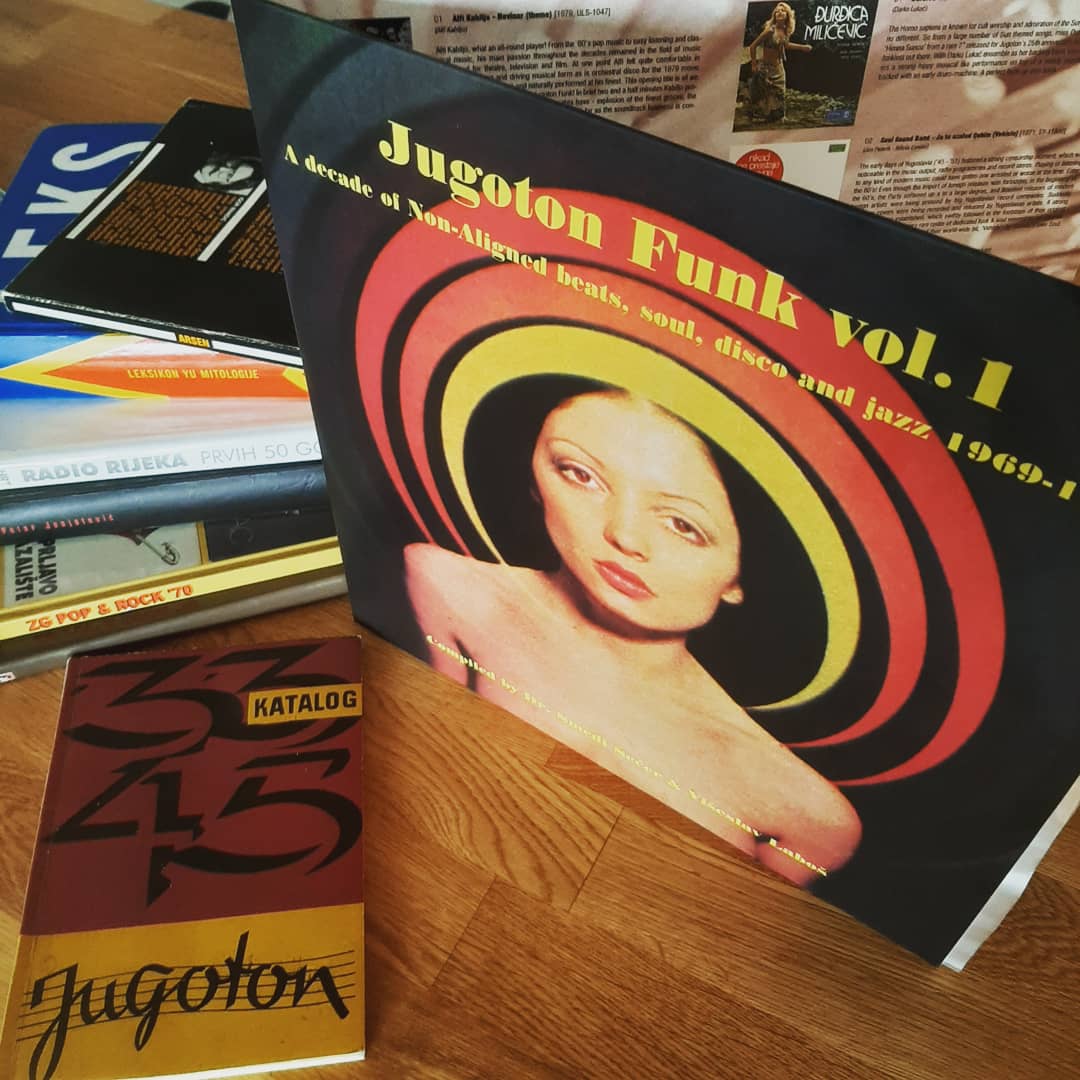
The digital and CD version of Croatia Records Jugoton Funk Vol. will be released shortly by Croatia Records. The extravagantly designed double vinyl album version is out now and was released under license by specialist Dutch vinyl company Everland Music. The last vinyl album produced by Jugoton’s vinyl pressing plant in Croatia was a disc containing the sermons of Pope John Paul II
For the latest travel info, bookmark our main travel info article, which is updated daily.
Read the Croatian Travel Update in your language - now available in 24 languages.
Croatian Singer to Melania Trump: Come Back to Balkans!
Melania Trump is the inspiration for Croatian singer Miki Solus' new single “Melanija”. Everything will be fine as long as the CIA and the FBI don’t come knocking on his door! “Melania has completely lost touch and has not been in Slovenia for ten years. She's alienated herself."
In the Balkans, Melania could be an inspiration for how just how far you can go with “a little bit of English,” but Solus urges her to go even further and reconnect with her homeland. He also believes she could use her considerable influence for a greater good.
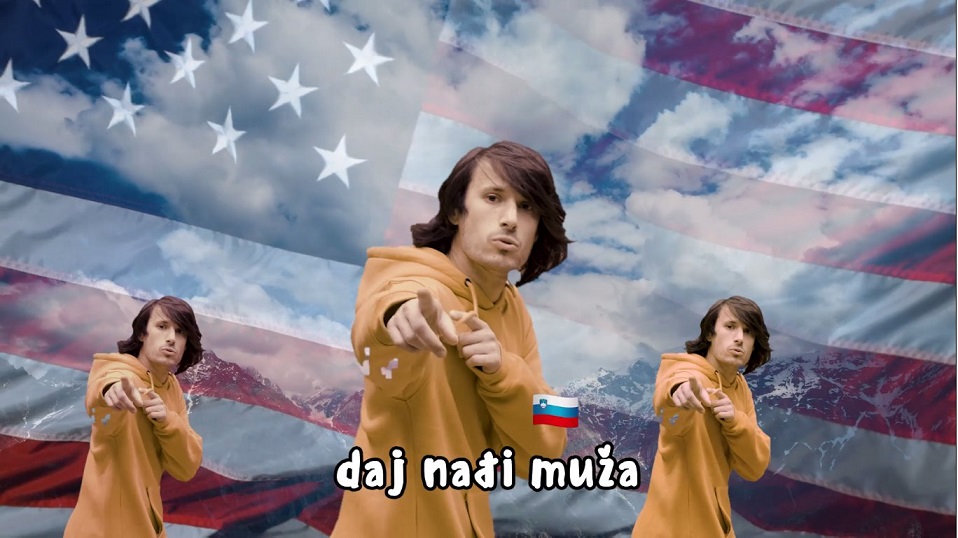
“I find it interesting that Melania has completely lost contact with her Slovenian homeland and the entire Balkan region. She has reportedly not been in Slovenia for ten years, let alone to her birthplace. She's alienated herself, and I want to remind her, through my song, to think about her roots a little! Who she is and where she comes from...and to influence her husband a little since she is in such a powerful position to do something good for this world,” Croatian singer Miki Solus reveals to Barbara Marinović/100posto on November 13, 2019; and introduces his new hit single: “Melanija”.
The song is dedicated to the first lady of the United States, Trump's wife and “Slovenian Rose” - as the Croatian singer teasingly calls her in his new single. This performance by Miki Solus could also get him into lots of trouble! When asked if he's afraid of The Donald's retaliation – because this song is not flattering to Trump at all; he replies, "Reprisals? What do I know? I don’t know. I’m a little scared, I'm thinking, Uh-oh, what if someone deletes my YouTube video in ten days, what if the CIA or the FBI come to my door, but I hope there won’t be any retaliation.” If the FBI knocks on the door of his Zagreb apartment - Solus will surrender to the mighty powers! What else can he do? “I would be powerless in that situation. I could fight and sue against this or that, but against the FBI or the US...I don’t stand a chance, the song will be gone and maybe I will be too…I'll disappear, yeah.” Miki jokes.

Making a Decent Living After Years of Work and Patience
He has been patiently working on his career for a long time and has just recently begun to make a decent living. “I've been doing this for seven or eight years since I released my first album. But it became serious about two or three years ago.”
“Everything started when I began working in theater and writing for others. It’s easier for me to write for others. As much as I try to do everything I do in a unique way, I cannot be as free when I work for someone else. Nevertheless, we can still deal with some more universal topics. Writing for others is a departure from myself, where my first goal is to be as innovative as I can. I try to express myself in a quality way but in a more standard pop form.”
Professor of Croatian Language and Art History
If he weren’t writing songs, he would be teaching. Soon Solus will obtain his degree as “Professor of Croatian Language and Art History” and he has already completed his teaching fellowship. “If I didn't have this (career in music), I would be teaching in school. I have already finished my fellowship and it was great. I would definitely like to work as a teacher for at least a couple of years, purely to get that experience because it’s a great job for someone who loves it.” When it comes to music, this unusual professor loves to study and is self-taught. He is learning to play various instruments himself. “I am learning to play the trumpet, and am nearly finished with that, and will begin studying violin next year. I never attended music school and am self-taught. I started near the end of high school, found some old guitar and began learning. In the age of the Internet one can really learn a lot. It's simple with instruments, at least in my opinion. When you learn to play one instrument, the next one comes easier...The principle is the same, one must simply master the physical aspects, but the whole philosophy is the same. It seems to come easy for me.”
Born in Germany and Built a Career in Croatia
He was born in Germany and came to Croatia when he was only three years old. “I lived in Germany for the first three years of my life and then my parents moved back here. I would not go back, I know how to write good songs, and I do my best in Croatian, so I'm fine with living here. As long as I can make my music and have an audience - I'll be fine”. He is aware that it would be easier to build his career in a larger country and sing in English, but he loves everything that he experiences in his home country. “There is a smaller audience for alternative music in this region. When considering concerts throughout the Balkans, there are two or three cities that are serious about this genre. There would be more of an audience elsewhere but also more competition. Working in the Croatian language is an advantage because we work among a small number of artists, relatively small, and it’s easier for me with a smaller crowd.” Solus reveals.
As one of the more talented young people in the alternative scene, this Zagreb-based musician will admit privately that he is rather boring and ordinary. “I walk the dog, watch football, go out with my girlfriend, and hang out with my friends. I enjoy walking my dog three times a day and love nature. I also like to go to the zoo and to Sljeme. It's a great break from making music, which requires a certain level of concentration, especially when working on a computer. Therefore, nature and animals are my best break from everything.”
He doesn’t have any specific ambitions except for continuing to make singles and albums. “’Melanija’ is coming out, and then I plan to drop two, three or four more singles by summer. The new album is planned for release before summer, and then I’ll quickly begin working on songs for the next album,” Solus says. Of course, unless everything is thwarted by Trump and his nefarious administration!
For more entertainment news follow our lifestyle page.
Check out Miki Solus' website here. Find him on Facebook here and on Instagram here.
Miki Solus / Melanija
Music / Lyrics: Miki Solus
Arrangement: Miki Solus / Silvio Pasarić
Melania, who did you marry for?
Melania, don’t you know your husband is a fool?
Melania, instead of a young husband
you married a rich old snail.
Melania, this is a cry from the Balkans
Melania, come back to us someday
Melania, you can stop the war
save this world, f*** the marriage.
Because you are a Slovenian Rose, and he is a maniac
let’s find you a husband who is not a psychopath
or ugly, because you are a delicate flower
Melania, save the world.
Melania, who made you do this?
Melania, how did you fall in love with that b******?
Melania, I know that you see a saint in him
but your husband is a walking bag of trash.
Melania, this is a cry from the Balkans
Melania, come back to us someday
Melania, you can stop the war
save this world, f*** the marriage.
Because you are a Slovenian Rose, and he is a maniac
let's find you a husband who is not a psychopath
or ugly, because you are a delicate flower
Melania, save the world.
Slovenian Rose, save the world!
Slovenian Rose, save the world!
Best Croatian Albums of 2019 So Far
July 18, 2019 - We're now officially beyond the midpoint of 2019 and this year has already shown us some great releases from Croatian artists. Here's a short list of a few new and notable Croatian albums along with an added bonus album from a few years ago that was included in the list for a very timely reason.
Fog Frog Dog - sdgvuigujheriptbnjieoang
Fog Frog Dog has a very unique sound that pushes boundaries in the originality department without sacrificing listenability. Although I can think of a few sources of inspiration for this particular album, I'm hard-pressed to find a band or artist to compare this to directly. There's just too much happening all over the place and there are too many layers to pin this down to a single comparison for reference. This album houses a collection of small, simple pieces that make up a much more complex whole, so I think it really needs to be heard in its entirety to be fully appreciated. The vocal melodies and lyrics are generally playful and catchy, bordering on familiarity with early psychedelic folk, but it's the instrumentation where this album really shines. There's an almost limitless variety in the sounds that are showing up at every corner of the listening experience with frequent changes in direction to keep even the shortest attention spans interested throughout the entire album. Ever since I heard Fog Frog Dog's 2015 album, I was looking forward to a sophomore release and now that it's finally here, I can say that it's definitely living up to my expectations.
You can find the album here.
Find is heavy on the synth and retro drum beats with mid-tempo melodies wrapped up in multiple steps of delay and walls of reverb. It seems to me like the influence for this particular piece lies somewhere between the mid-80s and early 90s but even still, the vibe is very modern and even futuristic at times. The album is pretty consistent throughout with a heavy dose of looping, ambience, dark undertones, and the occasional effect of a recorded instrument track temporarily slowing down to give that added element of somber atmosphere. It's an album that could easily pass for the soundtrack of a film in which all the scenes are set at night, in the rain, and it's the future, but everyone dresses like it's the 80s.
You can find the full album here.
nemanja - Tarot Funk
Like the album title suggests, this album is definitely funky, but there's also a lot of pieces of many other times and places that blend together to make something entirely new. I'd be surprised if anyone heard this and could pin down exactly where in the world it came from. It's largely instrumental, but you won't be longing for a vocalist when you hear these tracks. The songs vary in tempo and mood, but there is a sort of "danceable" groove throughout that will, at the very least, make listening heads nod along. Beyond the quality of the songwriting itself, I can also really appreciate the way this album was produced. In particular, there are certain moments where most of the instruments sound so crisp and clean but then there's one raw and dirty one thrown in there just to push the whole thing off balance enough to make a noticeable difference. This album sounds like a mix of many different cultures all coming together with a shared desire to move and shake to an entirely new beat.
You can find the full album here.
Seine - 22
Siene is back with a collection of guitar-based tunes with sparkling vocals and punchy drum arrangements. There is a sense of immediacy throughout the album, much like the feeling that something important is happening and we should pay attention because something even bigger is going to happen soon. The atmosphere is pretty well consistently dark and eerie with so few exceptions that when you hear the occasional moments of brightness, you'll surely notice the sharp contrast. Seine doesn't appear to be satisfied playing the familiar tones that allow our ears to stay comfortable knowing what's coming next and this album reflects what I can only imagine is a desire to bring something new to the world of sound by mixing a few well-known ingredients and employing a distinctly original delivery.
You can find the full album here.
Pseća Plaža - Povratak u lagunu br. 07
This album has a real true and honest sound to it; maybe because of the apparent minimalist production and limited use of effects on the guitars and vocals. It sounds like they wanted to keep the vocals, guitars, bass, and drums pretty clean so they could save all the allowable eccentricity for the sounds of the keyboards. Save for a few double-tracks and stereo effects here and there, many of songs sound like you're right there in the studio with the band and they're recording everything live off the floor. The band's distinct style is manifested by the vocalist's laid-back method and the prominence of the uniquely-styled keys and synths from track-to-track. Most of the tunes are mid-to-up-tempo and pretty chill but still upbeat and they have a vibe that makes me think of using the word "refreshing" to describe them, for some reason.
You can find the full album here.
Punčke - Sunčano s povremenom naoblakom
Punčke earned a recurring role on my stereo speakers after I heard their 2018 release, Valovi, which is a heavy-hitting and intense rock EP with a modern take on the 90's grunge flavour. I recently heard that Punčke is going on a hiatus of sorts with one of the band members moving abroad. So, to honour the legacy of a long-running and incredibly talented Croatian band, I wanted to include something from their back catalogue on this list which is otherwise reserved for the most current releases. From all the way back in 2013, Sunčano s povremenom naoblakom is just a fantastic rock album in the truest sense of the term "rock" without the use of a modifier to describe it. It's throwing highs and lows at you and keeping the tracks to their most distilled and purest form for maximum effect in the allotted time. There's not a second of filler on this collection. Each track is individually strong and can stand firmly on its own but when they're all combined together, you get an exceptionally dynamic and engaging rock album from start to finish. Here's hoping that we haven't seen the last of Punčke.
You can find the full album here.
To read more about lifestyle in Croatia, follow TCN's dedicated page.


